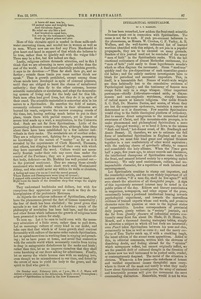 |
vol. title: Miscellaneous Scraps from January 1st 1878 vol. period: 1875-1878 pages in vol.: 153 |
< Spiritualism and Modern Culture (continued from page 5-42) >
A brave old man was he, |
More of this chivalric spirit is needed in these milk-and-water enervating times, and needed too in women as well as in men. Where now can one find any Flora Macdonald to give heart and hand in support of that which she believes to be true, rather than to ignobly sail with the vulgar tide? There may be a few, hut few indeed are they.
Lastly, religious culture demands attention, and in this I think that we are advancing in more rapid strides than the rest of the world. A final creed absolutely prohibits growth; it says to its devotees:—“Thus far shalt thou go, and no farther; outside these limits you must neither think nor speak.” Thus is growth prohibited, except among those whose minds have developed in spite of external pressure, until they are obliged to burst the chains of unhallowed authority; they then fly to the other extreme, become scientific materialists or secularists, and adopt the demoralizing system of living only for the body and for this life. Such men often lead good lives, but they do it in spite of their creed. The scientific materialist is somewhat akin in his nature to a Spiritualist. He searches the field of nature, reverently exhumes truths which in their ultimates are beyond his reach, outgrows the narrow cramping creeds of the time, but, having nothing much better to put in their place, treats them with partial respect, yet in times of severe trial sends up a wail, a supplication, to the Unknown God. Such are not far from Spiritualism. Little of the persecuting influence comes from them, although false ideas about them have been established by a few inferior individuals in their ranks. The secularists are of another order. They are a religious sect, fighting for a dogma, possessing no knowledge of the nature of “matter” so far as it is revealed by the experiments of Clerk Maxwell, Thomson, and others, but clinging to fancies of their own with which they have encrusted the word. Culture would not necessarily flourish under their rule any more than under the control of the Puritans; they are a ponderous, matter-off-act body, deficient—as Mr. Markley has well pointed out—in the poetical sentiment. They are among those already mentioned who would make short work with Westminster Abbey, and who could never say within its walls or cloisters,
A feeling sad came o’er me as I trod the sacred ground, |
They understand beefsteaks and dollars, but with few exceptions they appreciate poetry as much as they do the hieroglyphics of the prehistoric Mexicans.
As regards the religious influence of Spiritualism, already have the phenomena proved the fact of human immortality; the fear of death has been abolished; the proof given that miracle is no test of the truth of a doctrine; much of the philosophy of revelation has been laid bare, and the social and other forces which influence the growth of religions have been presented in action for study.
To sum up. Let it be ours to build even with the necessary admixture of a little error, rather than to pull down. Let us encourage culture of every kind in our midst, and take care that that which is of home growth shall contrast favourably with culture of the same order outside Spiritualism. Let us spend more time inworking than in singing and preaching; let us have peace at home, and avoid that contention with the outside world which necessarily results from trying to drag in antagonistic disbelievers by the necks and heels; rather than this, let us so improve ourselves that they shall come knocking at our doors asking for admittance. Finally, let us survey the whole human race with an undying love, even though we be misunderstood in our time, and forced by the errors of men to yield the body to the grave, and the spirit to God who gave it.
On Sunday next, February 24th, at 7 p.m., Mr. J. J. Morse will deliver a trance address in the Athenteam, Temple-street, Birmingham; subject—“Spiritualism as found in the New Testament.”
Intellectual Spiritism
It has been remarked, how seldom the front-rank scientific witnesses speak out in connection with Spiritualism. The cause is not far to seek. If such pre-eminent believers in the phenomena, as Messrs. W. Crookes, C. F. Varley, A. It. Wallace, and the well-known influential list of learned worthies identified with this subject, do not join in a popular propaganda, they are to be excused on many grounds, Readers of this journal need not be reminded of the many “men of faith” in the Spiritualistic ranks. With the hot emotional enthusiasm of almost Methodist excitement, the “men of faith” yield easily to those legerdemain scandals which so often disgrace the movement. Sham “mediums” quickly read the pre-dispositions of such masculine-gender old ladies; and the calmly cautious investigators have to blush for periodical and successful imposture. This, in itself, is a lamentable fact. Names of world-wide weight are thus habitually lost to the cumulative evidence of Psychological inquiry; and the testimony of famous men creeps forth only in a stage whisper. Other important personages—chiefly Litterateurs—stand aside, as dispassionate and non-emphatic watchmen, simply because of radical sneers at historic religions. Our noble friends S. C. Hall, Dr. Maurice Davies, and scores, of whom they are but the conspicuous spokesmen, maintain a reserve as determined as it is disastrous. Few sensible Spiritualists would cling to the feeble theological platform of orthodoxy. But to assume direct antagonism to the unmatched moral sweetness of Christ, and His mountain-side precepts, is to make phenomenal and philosophical Spiritualism a mere vulgar, clay-god worship; or to level it down to the intense “flesh and blood,” hot-dinner creed, of Mr. Bradlaugh and Annie Besant. If, therefore, we are to estimate the full force of intellectual Spiritualism in England and on the Continent, we must first bind great and original thinkers together in a rare confraternity of other world aspiration; with the undying charm of spirituelle affinity, to cement and consolidate the holy alliance. When the Times gave half a page, five years ago, to stance records and discussion, the intellectual champions of Spiritualism came boldly to the front, and amazed lettered society by a surprising united testimony. We only need cautiousness, culture, and unimpeachable character, for a repetition of such interest and encouragement.
Let Spiritualists combine to stamp out impostors, and the counterfeit article, and the most widely important of all anxious studies, “If a man die, shall he live again?” will soon absorb the attention of all thoughtful people. A sign of this ingeniously screened interest may be noted in the public prints of the day. Editors and literary contributors in magazines, newspapers, and other organs of the press, occasionally betray a profound intellectual leaning towards psychological experiment, and towards the marvellous evidence of trained experts whose cool words, and premiere character raise the question at once to the highest status of respectability. London correspondents of provincial daily papers, gossip writers in “society” journals, and the far from ghostly flaneurs of influential reviews continually essay faint fun about Dr. Slade, D. D. Home, Dr. Monck, and a thousand dancing mahogany tables, simply to advertise a subject in which all but fools are interested; even Punch takes Spiritualism between his nose and chin, occasionally to kiss as well as curse it; and the merry con freres of Tom Taylor catch up, if with a crackling laugh, the latest edition of the seance room apparitions. Added to this, in editorial comments, written with the slowness of dissolving doubt, and feeling abroad for the “opinion” which newspapers reflect, but cannot originally inflict, we see the possible drift of cultured thought in the direction of a theme now too well buttressed to be pushed aside, evaded, or contemptuously despised. The moral of the situation is obvious. When—in a few years—the nakedness of honest and verified experiment causes thoughtful men everywhere to throw off the mask and testify to what they really know about Spiritualistic investigation, the array of eminent and honourable persons will give the movement the most commanding distinction. Meanwhile, would it not be wise <... continues on page 5-44 >
Editor's notes
- ↑ Intellectual Spiritism by Markley, J. T., London Spiritualist, No. 287, February 22, 1878, pp. 87-8
Sources
-
London Spiritualist, No. 287, February 22, 1878, pp. 87-8

